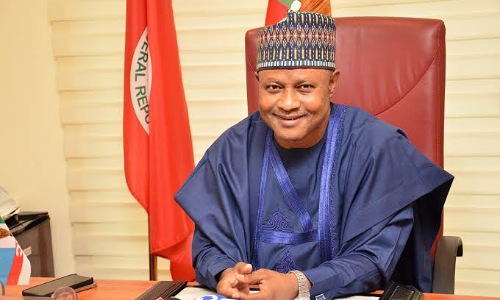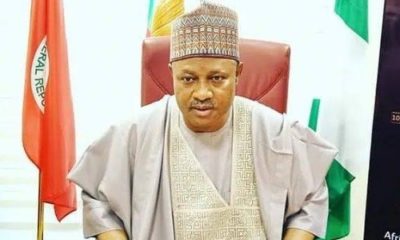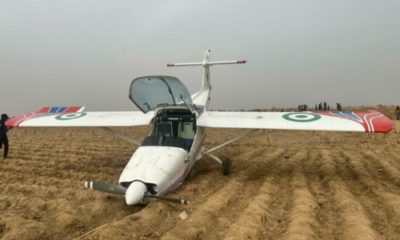NEWS
Gov. Sani Exposes 200m Illegal Arms Circulating In Nigeria

In a startling revelation, Kaduna State Governor, Senator Uba Sani, has raised alarm bells, citing that an estimated 200 million firearms are currently in circulation across Nigeria.
Speaking candidly on Channels Television’s Sunday Politics, Governor Sani attributed the surge in insecurity within the nation to this proliferation of weaponry.
Urgently calling for a comprehensive review of Nigeria’s firearms laws, the governor highlighted the pressing need for strategic measures to address the alarming situation.
He said “When I was in the Senate I tried to amend the Firearms Act because it is obsolete. The last time the Firearms Act was amended in Nigeria was over 30 years ago.
“The firearms act in Nigeria is not in line with the global best practices. Nigeria is the only country where you can be arrested with illegal firearms and can be taken to court and you can be released based on some charges and not imprisonment. You can pay a fine of about 50,000 naira and you can go home.
“That is why I started emphasising (firearms control) when the United Nations Regional Centre for Peace and Disarmament in Africa (UNREC), tabled the report when I was in the senate that about 200 million illegal firearms are in circulation in Nigeria out of the 250 million in circulation in West Africa.” he added
Expressing frustration, Governor Uba Sani lamented the apparent disregard for the reported presence of 200 million firearms, linking this indifference to the ongoing security challenges in Nigeria.
He emphasized that adopting state policing could effectively curb the prevalent insecurity issues, especially in the northern regions grappling with this menace.
He said, “In the last six months or thereabout, I have been insisting that we can only address the issue of insecurity if we establish state policing. I am happy that some few weeks ago some governors joined me in agitating for state police.”
NEWS
JUST IN: Senate Approves Tinubu’s ₦1.77trn Loan Request
To address Nigeria’s ₦9.7 trillion budget deficit for the 2024 fiscal year, the Senate has approved President Bola Ahmed Tinubu’s request to secure a ₦1.77 trillion ($2.2 billion) loan.
The decision was made during Thursday’s plenary session, where a voice vote confirmed the approval following the presentation of a report by the Senate Committee on Local and Foreign Debts.
RELATED NEWS: Tinubu Seeks ₦1.767tn Loan to Tackle 2024 Budget Deficit
Chaired by Senator Wammako Magatarkada (APC, Sokoto North), the committee endorsed the loan request as a vital step in managing the country’s fiscal challenges.
Recall that President Tinubu had submitted the proposal earlier in the week, outlining the loan as a crucial component of his administration’s external borrowing strategy.
Details shortly…………..
NEWS
Finnish Police Arrest Simon Ekpa Over Terror-Related Allegations
Simon Ekpa, a Finnish citizen of Nigerian descent, has been arrested by Finnish authorities on allegations of inciting terrorist activities.
The Päijät-Häme District Court ordered his detention following an incident that reportedly occurred in Lahti on August 23, 2021.
READ ALSO: Policeman Feared Dead As Gunmen Attack Checkpoint In Abia
The Finnish National Bureau of Investigation (NBI) is also seeking the arrest of four other individuals in connection with the case. Officials say the charges involve public incitement to commit crimes with terrorist intent.
“The detention demands are related to a preliminary investigation in which a Finnish citizen of Nigerian descent, born in the 1980s, is suspected of public incitement to commit a crime with terrorist intent,” the police said in a statement.
Details regarding the additional suspects or the specifics of the alleged crimes remain unclear as the investigation continues. Authorities have emphasized the sensitive nature of the case, stating that further information will be disclosed as the inquiry progresses.
This development marks a significant step in Finland’s efforts to combat terrorism and ensure public safety.
International News
COP29: Climate Summit Faces Deadlock Over Vague Funding Proposals For Vulnerable Nations
As the 29th United Nations Climate Change Summit (COP29) nears its conclusion, tensions are rising over a newly published funding proposal aimed at assisting developing nations in addressing climate-induced crises.
The proposal, released by the United Nations Framework Convention on Climate Change (UNFCCC) on Thursday, has sparked widespread debate among delegations, activists, and observers at the summit.
The document, spanning ten pages, outlines funding options to support developing countries in implementing their Nationally Determined Contributions (NDCs) under the 2015 Paris Agreement.
READ ALSO: Osun Explains N75,000 New Minimum Wage
However, it fails to specify how much wealthier nations are required to contribute annually—a key sticking point that has drawn criticism from the Global South and climate advocates.
Ambiguity in Funding Commitments
Critics argue that the absence of concrete figures undermines the credibility of the proposed framework.
Mohamed Adow, Founder and Director of Power Shift Africa, described the proposal as “a blank piece of paper,” highlighting the lack of clarity on financial commitments.
“This is the ‘finance COP.’ We came here to talk about money. The way you measure money is with numbers. We need a cheque, but all we have right now is a blank piece of paper,” Adow remarked during an interview.
The Global South, led by African delegations, is demanding at least $1.3 trillion annually by the end of the decade to adapt to climate change impacts and transition to sustainable energy systems.
Yet, developed nations have yet to commit to a specific annual figure, raising concerns over the summit’s ability to deliver tangible outcomes.
Key Provisions and Concerns
The new text acknowledges the disproportionate impact of climate change on developing nations and the financial barriers they face, including high costs of capital and limited fiscal space.
READ ALSO: NNPCL Launches Utapate Crude Oil Blend, Eyes Production Expansion In 2025
It proposes the establishment of a New Collective Quantified Goal (NCQG) for climate finance, suggesting a framework of “at least USD [X] trillion annually” from 2025 to 2035.
However, the absence of defined numbers has led to frustration among negotiators.
David Tong, Global Industry Campaign Manager at Oil Change International, emphasized the critical role of finance in achieving meaningful progress.
“Without finance, there is no phase-out [of fossil fuels], no energy transition, no adaptation. The ambitious options are simply missing,” Tong stated during a press briefing.
Rising Frustration from the Global South
Delegates from the Global South have expressed dissatisfaction with what they perceive as weak commitments from developed nations.
Many fear that without concrete financial pledges, the summit’s outcomes may fall short of expectations.
“This summit is about delivering justice to those who suffer most from climate impacts. Wealthy nations must step up and provide the necessary funding,” said an African negotiator, speaking on condition of anonymity.
A Critical Juncture
With less than 48 hours remaining in the summit, the stakes are high. The COP29 negotiations in Baku, dubbed the “finance COP,” are expected to set a precedent for addressing the financial needs of vulnerable nations.
Delegates are calling on world leaders to finalize an ambitious NCQG target and bridge the growing divide between developed and developing nations.














